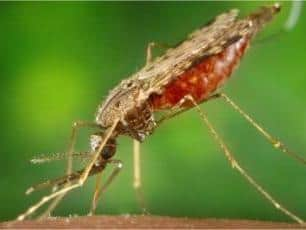As the world still struggles with coronavirus, scientists at Milton Keynes Open University tackle a different deadly disease
and live on Freeview channel 276
Members of the team from the Faculty of Science, Technology and Mathematics are leading on a project called DETECT with the aim of reducing cases of malaria.
Malaria is borne by mosquitoes and the project will use Space technology to identify the insects' breeding grounds.
Advertisement
Hide AdAdvertisement
Hide AdUsing a system that wields satellite and other data, DETECT hopes to forecast and destroy outbreaks of malaria in French Guyana, where 90 per cent of the land is covered by tropical Amazonian forests.


Predicting where mosquitoes will flourish relies on identifying areas with warm air temperatures and calm waters, such as ponds and puddles, which they need for laying eggs.
Once identified, targeted sprayer drones will release biocontrol agents that will combat the disease in its earliest stages, killing mosquito larvae without affecting other species.
OU senior Senior Lecturer Dr Andrea Berardi is principal Investigator on DETECT and he and his team have just received £379,000 funding from the UK Space Agency.
Advertisement
Hide AdAdvertisement
Hide AdHe said: “It is worth remembering that all of the other diseases like malaria, which existed before Covid-19, are just as problematic, during this pandemic, and in some cases are being exacerbated by the disruption caused."
DETECT is one of the 10 new cutting-edge projects that the UK Space Agency announced this week, on World Humanitarian Day, to help tackle global development problems ranging from the spread of malaria to human trafficking.
A Space Agency spokesman said: "Earth-gazing satellites have the potential to be one of our most dynamic weapons against disease outbreaks of all kinds – they can help us predict outbreaks in the same way we predict the weather.
"Variables such as temperature, rainfall, vegetation, land cover and land use all affect the number of mosquitoes present, and their ability to transmit viruses. Today these variables can be measured from remote sensors on satellites, planes and unmanned aerial vehicles. We can then estimate the likelihood of mosquito presence and disease transmission."
Advertisement
Hide AdAdvertisement
Hide AdHe added: " We know malaria-free countries have five times greater economic growth than countries with malaria. And it’s a disease that still holds back many countries – particularly in West Africa – whose young populations should be driving dynamic economies. But no country can undertake the ambitious goal of ending malaria alone. Global partnerships among donors, local governments and the private sector are critical to freeing communities from malaria.
"The world is at a tipping point in the fight against malaria. This moment is an opportunity to push progress forward rather than risk the dangers of a backslide."
Mosquito-borne diseases have a major impact on developing countries. In 2018, there were an estimated 228 million cases and 405,000 deaths from malaria alone.
Dr Berardi said: “Our ground-breaking initiative, led by a diverse and experienced team, is an opportunity to combine cutting-edge remote sensing technologies, human centred design and targeted drone spraying of biocontrol agents to deploy an alternative community-led vector-control strategy.
Advertisement
Hide AdAdvertisement
Hide AdIn collaboration with local communities, we will be able to develop a service which could demonstrate more effective control at lower cost, potentially revolutionising mosquito vector control across the world and saving many lives.”